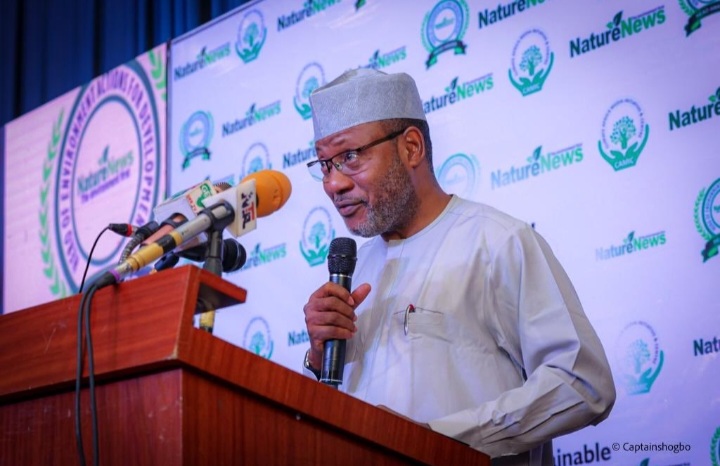FG has taken steps to prevent a repeat of 2022 flooding – Minister

Minister of Environment, Barr Mohammed H Abdullahi, was at the second anniversary lecture and HEAD Awards ceremony of NatureNews. He spoke with KAYODE FALADE and FATIMA SAKA. Excerpt.
There have been conflicting figures of what was allocated to Ecological funds in the 2023 budget. Can you shed light on this?
I think we should try to understand how this government works. The general understanding is that the Ministry of Environment oversees the issues of our ecological system and any other nature-related activities. However, I think in the wisdom of this government, there’s a distinct the Ecological Project Office called EPO domiciled within the Office of the Secretary to the Government of the Federation (SGF). They oversee the budget and not only the budget; they oversee the work plan that concerns ecological degradation of the country. They are in charge of funding and the budget of ecological funds. The Ministry of Environment only has oversight over the agency. But I know that at a time, the state governors insisted that their share of ecological funds be shared to them.
Now, the practice is that every month after the FAC meeting, the share of ecological funds meant for the states actu and FCT and then the component for the Federal Government is left for the office of the Ecological Project Office, which in turn look at work plans submitted by the coastal communities for some ecological interventions.
So, as it were, it would be very difficult for me as a minister to tell you, this is the budgetary provision for ecological funds.
The Federal Executive Council had just released .. to purchase operational vehicles in the Ogoni cleanup project. How far has the Federal Government gone with the Ogoni cleanup and other related projects in the country?
Specifically, the Ogoni cleanup is a very special intervention programme that has a tripartite approach of the United Nations Environmental Programme, and the IOCs who are also contributing some money towards the cleanup and then the Federal Government as a trustee of the Ogoni. What we do is to follow through the plan, the programme of action put forward by UNEP that did the indepth study of the devastation of Ogoniland.
So far, the federal government has taken steps to implement such recommendations including the remediation of contaminated sites, including development of a level programme and to support the people because they have lost part of their livelihood in terms of agriculture activities, fishing, and others. So what we are doing with the governing council, collectively with the EPO project office, is to develop these programs.
The Ministry of Environment, and the governing council remediated over 54 contaminated sites. And as at December last year the Federal Government also approved the remediation of 39 semin complex sites in Ogoni land. And we just finished the procurement. We are on it. Very shortly, the contractors will mobilize to site and they will begin to do the remediation work. We had about six completed water projects. The Federal Government provided about 16 additional water projects to provide potable water for the people.
Also, last year in December, the Federal Government also approved about N27 billion for the Ogoni power project to support their livelihood programme.
Essentially, based on the studies carried out, we are of the view that effective power supply through the national grids to the Ogoni people will spur economic activities, power some small scale industries, spur the development of factories which will in turn generate economic activities and employment for the youths as well as encourage them to begin to be self-sustaining.
We are doing our best to ensure that we live within the objectives of the recommendations.
Flooding in the country has almost become perennial. But that of last year was particularly devastating. What are you putting in place to forestall a reoccurrence?
I understand that the issue of flood is very devastating. But part of the major causes of flooding is from human attitudes and humans approach to some of these disasters.
The Federal Ministry of Environment has developed what is called early warning signs which are shared with relevant states and the areas which we finding are flood-prone. There is an area we call flood belt. This are communities around River Niger, River Benue and communities around major rivers. We try to give advice, that these people must be resettled by the state governments in the uplands rather than the valley across the river. They have refused that.
And then the state governments keep issuing CofOs for people to build residences within the banks of the river, for the purpose of revenue generation. But that’s inimical to the people. And of course they are prone and exposed to flooding.
However, what the Federal government did through Mr President was to empanel a team between the Ministry of Water Resources, Ministry of Agriculture, Ministry of Environment, and other agencies like NiMet and NEMA to bring the plan that will mitigate against the recent flooding experienced in Nigeria, and then put in place steps to avoid a repetition of such devastation, also to sensitize the citizens towards ensuring that they avoid staying in flood-prone areas. So, these are part of the measures we are taking, and it’s driven by the Ministry of Water Resources and not the Ministry of Environment.
